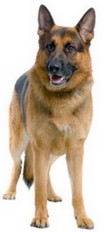

German Shepherd: Personality & Health Issues
German Shepherd:
The German Shepherd needs daily brushing and only one or two baths a year. It may suffer from chronic eczema, keratitis, (inflammation of the cornea), and hip dysplasia. To avoid buying a sickly dog, always go to a reputable breeder. The German Shepherd is one of the most intelligent dogs and one of the best guard dogs.
Average Lifespan Of The German Shepherd:
Average Weight: 60-85lbs.
Inherited Health Disorders:
Eyes:
Hairy Growth On Eye (Dermoid): See eyelash health for dogs. , Folded Out Third Eyelid , Inflammation Of The Third Eyelid
Chronic Superficial Keratitis: Red mass on the cornea.
Senile Cataract
Brain:
Epilepsy: Defined as a state in which repeated seizures occur. The interval between seizures may only be minutes, but it is usually hours or days and even several months. Epileptic attacks may start to occur some weeks or (usually) months after a blow to the head, such as might occur in a car accident. This is due to scar tissue contracting and producing a source of irritation within the brain. Many epileptic attacks are classified as "idiopathic epilepsy", which means the condition is of unknown cause. Treatment of epileptic dogs is frequently very rewarding, but you will need a close liaison with your vet to find the correct drugs and most suitable dose rate.
Kidney:
Renal Cortical Hypoplasia: (A condition in which the cortex of the kidney(s) does not develop completely. See the page on kidney diseases in dogs for more information.)
The German Shepherd needs daily brushing and only one or two baths a year. It may suffer from chronic eczema, keratitis, (inflammation of the cornea), and hip dysplasia. To avoid buying a sickly dog, always go to a reputable breeder. The German Shepherd is one of the most intelligent dogs and one of the best guard dogs.
Average Lifespan Of The German Shepherd:
Average Weight: 60-85lbs.
Inherited Health Disorders:
Eyes:
Hairy Growth On Eye (Dermoid): See eyelash health for dogs. , Folded Out Third Eyelid , Inflammation Of The Third Eyelid
Chronic Superficial Keratitis: Red mass on the cornea.
Senile Cataract
Brain:
Epilepsy: Defined as a state in which repeated seizures occur. The interval between seizures may only be minutes, but it is usually hours or days and even several months. Epileptic attacks may start to occur some weeks or (usually) months after a blow to the head, such as might occur in a car accident. This is due to scar tissue contracting and producing a source of irritation within the brain. Many epileptic attacks are classified as "idiopathic epilepsy", which means the condition is of unknown cause. Treatment of epileptic dogs is frequently very rewarding, but you will need a close liaison with your vet to find the correct drugs and most suitable dose rate.
Kidney:
Renal Cortical Hypoplasia: (A condition in which the cortex of the kidney(s) does not develop completely. See the page on kidney diseases in dogs for more information.)
Blood:
Hemophilia: Hemophilia is a disorder in which blood will not clot properly to aid in the healing of wounds. A dog with a mild form or hemophilia might never even need treatment, unless excessing bleeding occurs due to trauma or surgery. Unfortunately, dogs with severe hemophilia often die from uncontrollable bleeding problems. Once you know your dog is affected, your vet will help you with managing this lifelong disorder. This will include being vigilant for signs of bleeding, and occasional blood transfusions.
Heart:
Persistant Right Aortic Arch: A disorder in newborns, in which the aortic arches (blood vessels that are supposed to disappear before a dog's birth) remain, inhibiting the growth of and disturbing the function of the esophagus. This will cause the dog to regurgitate its food and stunt its growth. The only cure is surgery to remove the blood vessels causing the problem.
Mouth:
Clefts Of Lip And Palate
Gullet:
Esophageal Achalasia: A disorder in which the esophagus does not have the strength to pass food directly into the stomach. The food tends to accumulate in the throat and is often regurgitated. It can be treated with liquid diets and having the dog eat in a standing position.
Bones:
Hip Dysplasia
Skin:
Anal Furunculosis: an abcess at the anal region, causing painful defecation and blood in the feces. Surgery may be required to relieve the problem (removing the affected tissue) but may not cure it.
Hemophilia: Hemophilia is a disorder in which blood will not clot properly to aid in the healing of wounds. A dog with a mild form or hemophilia might never even need treatment, unless excessing bleeding occurs due to trauma or surgery. Unfortunately, dogs with severe hemophilia often die from uncontrollable bleeding problems. Once you know your dog is affected, your vet will help you with managing this lifelong disorder. This will include being vigilant for signs of bleeding, and occasional blood transfusions.
Heart:
Persistant Right Aortic Arch: A disorder in newborns, in which the aortic arches (blood vessels that are supposed to disappear before a dog's birth) remain, inhibiting the growth of and disturbing the function of the esophagus. This will cause the dog to regurgitate its food and stunt its growth. The only cure is surgery to remove the blood vessels causing the problem.
Mouth:
Clefts Of Lip And Palate
Gullet:
Esophageal Achalasia: A disorder in which the esophagus does not have the strength to pass food directly into the stomach. The food tends to accumulate in the throat and is often regurgitated. It can be treated with liquid diets and having the dog eat in a standing position.
Bones:
Hip Dysplasia
Skin:
Anal Furunculosis: an abcess at the anal region, causing painful defecation and blood in the feces. Surgery may be required to relieve the problem (removing the affected tissue) but may not cure it.
Exercise Requirements: 4/5
Affection Level: 3/5
Friendliness-Other Pets: 3/5
Friendliness-Strangers: 2/5
Ease Of Training: 5/5
About The Ratings:
Exercise Requirements:
1: Low, 5: High
Affection Level:
1: Introverted, 5: Extroverted.
Friendliness-Other Pets:
1: Least Friendly, 5: Most Friendly.
Friendliness-Strangers:
1: Least Friendly, 5: Most Friendly.
Ease Of Training:
1: Most Difficult, 5: Least Difficult.
Affection Level: 3/5
Friendliness-Other Pets: 3/5
Friendliness-Strangers: 2/5
Ease Of Training: 5/5
About The Ratings:
Exercise Requirements:
1: Low, 5: High
Affection Level:
1: Introverted, 5: Extroverted.
Friendliness-Other Pets:
1: Least Friendly, 5: Most Friendly.
Friendliness-Strangers:
1: Least Friendly, 5: Most Friendly.
Ease Of Training:
1: Most Difficult, 5: Least Difficult.

German Shepherd
Temperament:
Temperament:
Pet Meds: Dogs | Pet Meds: Cats | Dog Health : By Breed | Cat Health : By Breed | Dog Grooming | Cat Grooming | Pet Top 10's | Pet Food Recipes
From Accessories To Toys To Vitamins......
Browse products made for dogs and cats in our online pet store!
Browse products made for dogs and cats in our online pet store!
Pet Meds: Dogs Pet Meds: Cats Common Dog Health Issues Common Cat Health Issues Dog Grooming Cat Grooming Pet Top 10's
Pet Health:Home
Copyright 2006-2011 PetMedsOnline.Org
